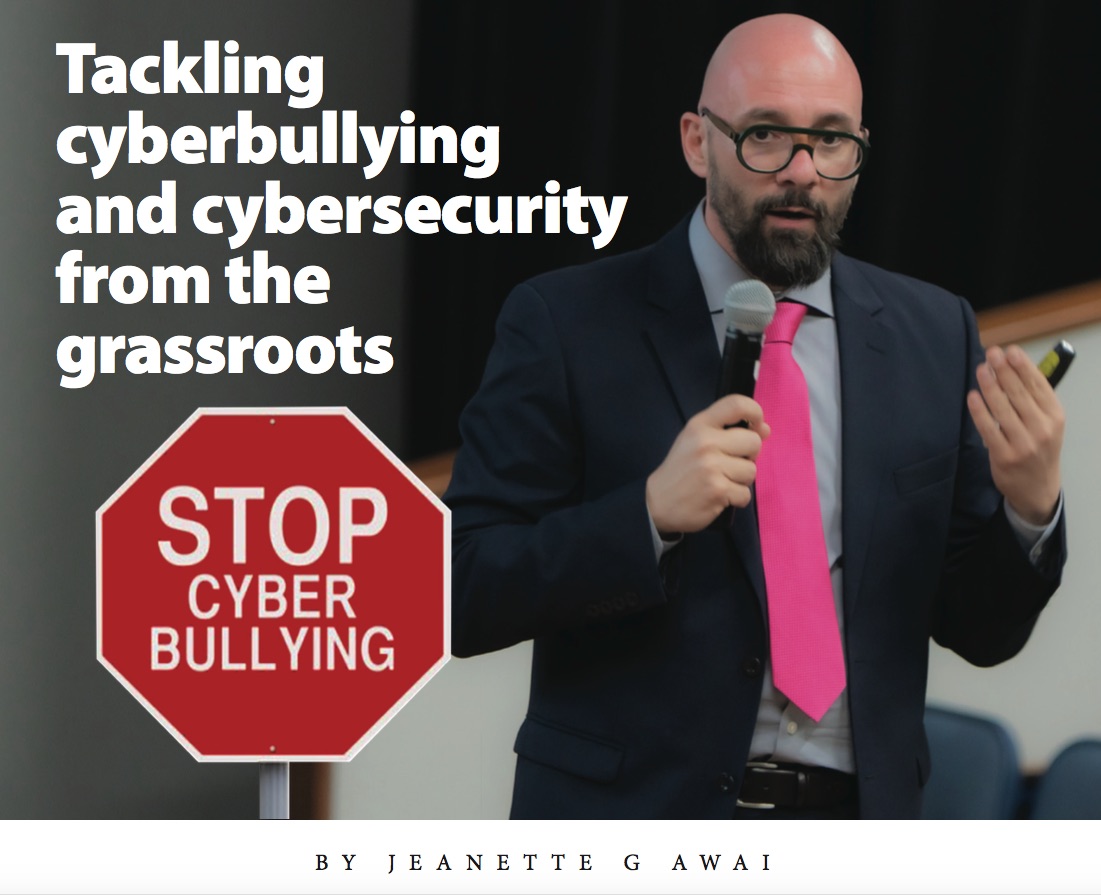
We need to move away from scaremongering when talking about cybercrime and cyberbullying—that’s bloated and sensationalised. We want to empower people instead of simply safeguarding; that’s how we can make young people more digitally resilient.”
This was the rallying call of Dr Vasileios Karagiannopoulos, Visiting Scholar at the Department of Behavioural Sciences in the Faculty of Social Sciences. He delivered a stirring public lecture on “Cybercrime Awareness, Cyberbullying and Cybersecurity Threats” in March to a diverse audience of students, cyber enthusiasts, lecturers, and policymakers, among others.
Dr Karagiannopoulos, or “Vas” as he is commonly called, is an Information and Technology lawyer and associate professor at the University of Portsmouth who specialises in Cybercrime and Cybersecurity. Through The UWI St Augustine’s partnership with the University of Portsmouth and talks with Dr Talia Esnard, Head of the Department of Behavioural Sciences, Dr Karagiannopoulos visited the campus and shared his research from his work with his university’s Cybercrime Awareness Clinic in the UK.
He began his lecture by exploring the phenomenon of online harassment through cyberbullying (bullying that takes place online) and how young people would be affected by it across technologies such as social media, gaming, and other online platforms. Cyberbullying can manifest as harassment in anonymous anything-goes types of forums such as 4chan and 8chan, and as revenge porn posting to dedicated pornography sites.
He said that 27 percent of UK students experience cyberbullying. However, not only are they victims, but they can also be perpetrators. Peer pressure may be the reason this occurs, which is also a catalyst for bullying offline. Dr Karagiannopoulos also pointed out that cyberbullying statistics are even higher than the numbers shown because cases often go unreported.
How does the law offer protection from online harassment and cyberbullying perpetrators? Based on the UK legal framework, Dr Karagiannopoulos provided an overview of the acts related to cyber communication offences. The Harassment Act covers online stalking specifically involving a fear of violence. To prove that harassment occurred, the offender must show intent and consistency; this makes it difficult to prosecute and resolve cases.
He also mentioned the Malicious Communications Act and the Computer Misuse Act, where a revenge porn law is present, but many cases do not make it to court.
“All these acts have their deficiencies, including the Online Safety Bill,” he said.

Dr Karagiannopoulos shared that there is a push for digital companies to police content pre-emptively, and remove content that is illegal. “The Online Safety Bill expects companies to have a duty of care to protect content that is harmful to young people.”
He said that an upcoming law which states companies should be responsible for age verification may be passed.
But not everything can be dealt with through the law. This is due to the pace of technological advancement. Dr Karagiannopoulos shared how his Cybercrime Awareness Clinic uses a more grassroots communication-based solution.
“Young people go to their parents and teachers about cyberbullying, and they’re not prepared to give advice. They don’t know what young people are doing online, or how to spot issues. Young people view their parents’ advice as obsolete,” said Dr Karagiannopoulos.
In his eyes, the solution to the problem of educating young people and making them more cyber aware is simple: don’t talk down to them, have them talk to each other.
Dr Karagiannopoulos stresses that because parents can be technophobic or digitally unaware of the problems facing young people, and schools are often not equipped to do in-depth work, cyberbullying and cybercrime can be best addressed by developing grassroots solutions that come from young people, their parents and schools, and education.
“It is important for governments to not issue advice non-stop or create initiatives that are government-focused or law enforcement-focused, but to fund multi-stakeholder efforts where schools will come together with academia, law enforcement, and with young people.”
At his Cybercrime Awareness Clinic, young people are engaged in skills-based training to teach their peers about age-appropriate cyber issues. The clinic aims to help improve young people's emotional awareness and digital citizenship. This involves training them to behave the same online and offline. The clinic also equips them with critical thinking skills.
During a follow-up conversation, he shared how this was implemented in one of the clinic’s programmes aimed at training youth from primary school to university to be cyber ambassadors. This incorporates language and tools that are relatable to them based on feedback given by the relevant age groups.
For secondary school and university students, the focus was on mapping out harms and risks that might affect them, and how they could identify them and use the emotional awareness and critical-thinking skills learned in the clinic to be more digitally resilient. They learned how to improve their well-being and online hygiene by recognising when certain websites may be harmful.
The transition from fear-focused training to one based on nuance, self-awareness, and empowerment resonates with young people. This model also works well with businesses. Businesses may become more cyber aware by learning from each other, and moving the conversation away from focusing on the dangers of cyber threats to highlighting the positive benefits of cybersecurity and data protection.
During the Q&A portion, the audience asked questions ranging from topics such as cyberbullying parenting tips to cybersecurity procedural policy. The cyberbullying and cyber issue conversation is ongoing.
As Dr Esnard puts it, “Cyberbullying is a symptom, not a cause – it is a behaviour.”
For more about the Department of Behavioural Sciences’ programmes, please visit: https://sta.uwi.edu/fss/behaviouralsciences/.
For more information on cybersecurity and protecting yourself online, visit CyberSafeTT at cybersafett.com.